Ever felt like you’ve squeezed every creative drop out of your content calendar? Struggling to brainstorm fresh campaign ideas? Need help turning numbers into actionable insight? Welcome to the age of AI prompt engineering, a technique that empowers you to unlock the potential of powerful generative AI tools.
Think of tools like ChatGPT, Bard, or Copilot as the next evolution of search engines. Instead of simply returning relevant web pages, they can generate creative text formats, translate languages, write different kinds of creative content, complete complex math equations, and even assist with coding tasks — all based on the prompts you provide.
What is prompt engineering?
Imagine having a powerful conversation partner with access to a vast library of information. This is essentially what you get with AI-powered language models. However, just like any good conversation, the quality of the interaction hinges on how you initiate it. This is where prompt engineering comes in.
Prompts are the instructions you provide to the AI, guiding it toward the specific outcome you desire. The more precise and well-crafted your prompt is, the more helpful and relevant the AI’s response will be.
Think of it like searching a library. A vague query like “find something interesting” will yield a mountain of irrelevant results. However, a focused prompt like “find books on the history of artificial intelligence published in the last year that are also available in ebook format” leads you directly to the information you seek.
These language models are trained on massive amounts of text data, giving them the ability to predict the next word in a sequence and understand the nuances of human conversation. They learn and adapt as you interact with them. That’s why providing the right prompt from the outset is crucial for unlocking the full potential of this powerful technology.
How are content marketers using prompt engineering in 2024?
One of generative AI’s most relied-on (and perhaps most controversial) uses in 2024 is content creation. Simple AI tools like Grammarly can run spelling and copy-editing checks, but a handful of tools take things a huge step further. Consider the following benefits of using AI for content creation, along with some engineered AI prompts that might help inspire content creators when using generative tools like ChatGPT:
Streamline content creation
Prompt-based AI can help you brainstorm new blog posts, generate product descriptions, craft engaging social media captions, and even write website copy in different tones and styles.
Example prompts for content creation:
- “Create a listicle blog post with 10 engaging tips for businesses to leverage social media marketing in 2024.”
- “Write a personalized email campaign for customers who haven’t purchased in the past three months, offering exclusive deals and re-engaging them with our brand.”
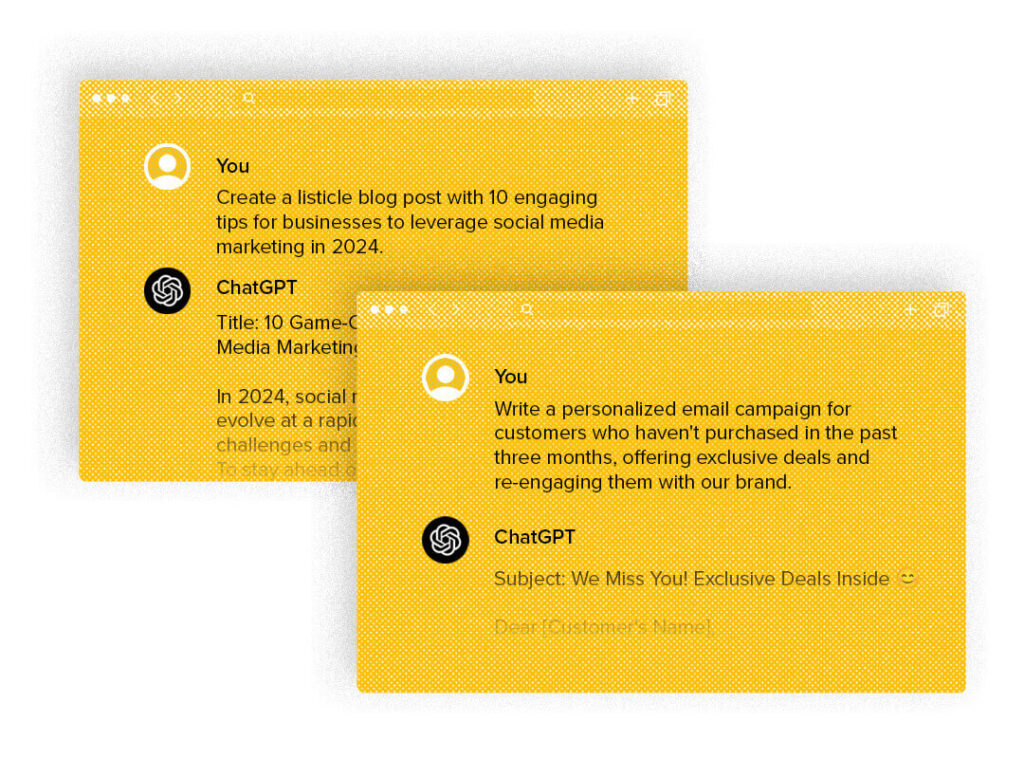
Banish writer’s block
Hit a creative wall? AI can help you jumpstart your writing process. Use it to generate outlines, suggest alternative phrasing, simplify technical terms, or even draft entire sections based on your initial ideas.
Example prompts to get the creative juices flowing:
- “Continue this paragraph about the benefits of using explainer videos in marketing campaigns, focusing on increased engagement and improved conversion rates.”
- “Explain the concept of blockchain technology clearly and concisely, suitable for a general audience with no prior technical knowledge. Use simple language and relatable examples.”
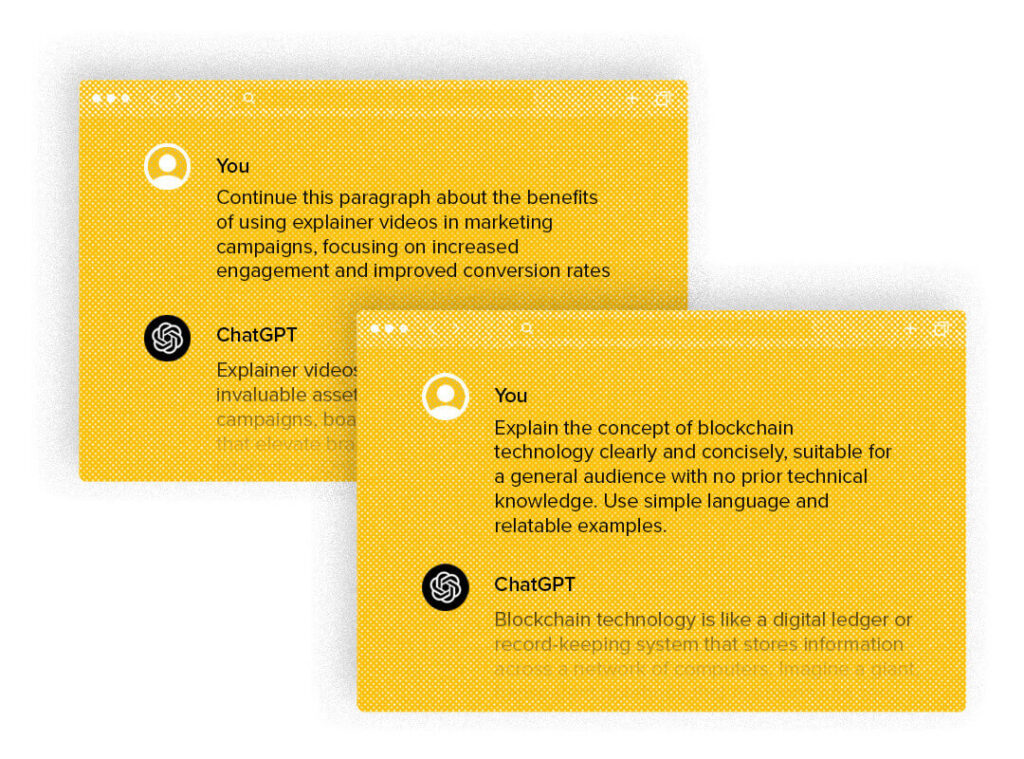
Diversify content formats
Expand your content repertoire beyond traditional text. Use generative AI prompts to create scripts for explainer videos, product descriptions in a conversational tone, or even catchy email subject lines.
Example prompts to expand your content’s range:
- “Write a 2-minute script for an explainer video that introduces the key features and benefits of our new productivity software, targeting busy entrepreneurs.”
- “Generate five engaging email subject lines promoting our upcoming webinar on social media marketing best practices, using a sense of urgency and highlighting the potential benefits for subscribers.”
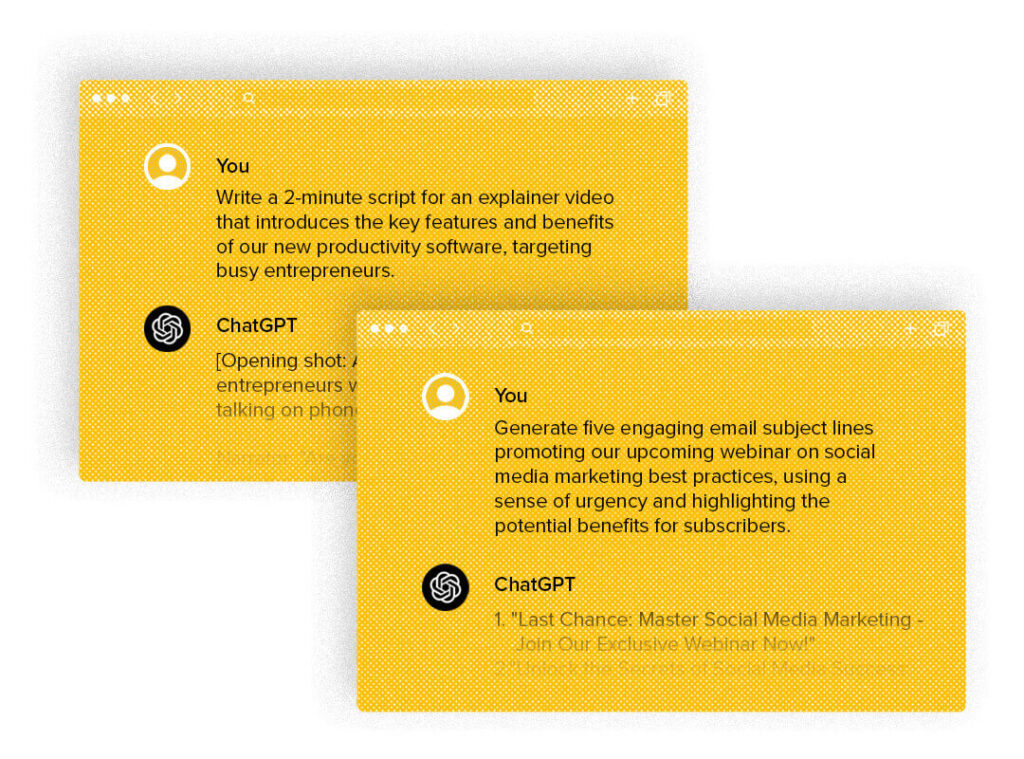
A word on risk: Responsible use of AI-generated content
It’s important to remember that AI-generated content is a powerful tool, but it’s not a replacement for human expertise and is often easily detectable to human readers. Here are some key considerations:
- Fact-check and edit: AI-generated content may not always be factually accurate. Always double-check the information and edit for clarity, tone, and brand consistency.
- Prioritize ethical considerations: Be mindful of potential biases in the training data of AI models. Use prompts that promote inclusivity and avoid reinforcing stereotypes.
- Maintain human editorial oversight: The human touch remains essential. Use AI as a springboard for creativity, not a crutch for critical thinking.
Another essential risk of AI content creation: sinking your site in the SERPs. Google’s most recent core algorithm update in March 2024 has caused significant volatility for sites with AI-created content. Proceed with caution and ensure you are using AI responsibly to avoid being penalized in the SERPs.
Beyond content creation: Using AI as your technical teammate
While content creation support can be a benefit of prompt engineering, AI offers all kinds of technical applications for marketers and growth leaders. Let’s explore how leveraging AI can go far beyond catchy headlines and blog posts:
Unveil customer insights with statistical modeling
Gone are the days of gut feeling or intuition driving marketing decisions. AI tools can analyze vast amounts of customer data to identify trends, predict customer behavior, and inform targeted marketing strategies.
Example prompts for uncovering actionable insights:
- “Using historical sales data and customer demographics, develop a statistical model to identify which customer segments are most likely to respond positively to our upcoming discount promotion.”
- “Analyze customer sentiment from social media conversations and online reviews to identify areas of customer satisfaction and dissatisfaction with our brand, focusing on recurring themes and potential areas for improvement.”
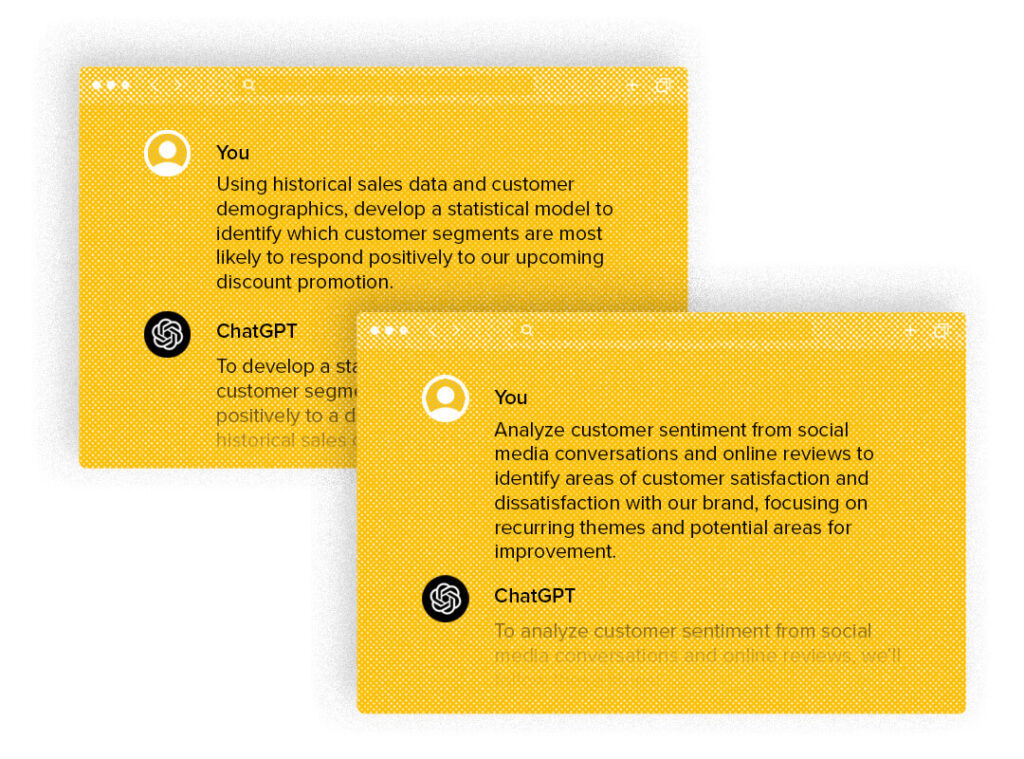
Forecast future success (and slowdowns) with sales prediction
Predicting future sales performance is crucial for strategic planning. Marketers can utilize AI to analyze market trends, competitor activity, and historical sales data to generate accurate sales forecasts.
Example prompts to help you look ahead and see what might be around the corner:
- “Based on current market conditions, competitor analysis, and historical sales trends, predict our sales figures for the upcoming quarter, incorporating a best-case, mid-range, and worst-case scenario.”
- “Develop a machine learning model that forecasts customer churn based on past purchase history, website activity, and demographic information. Identify customers at risk of churning and implement targeted retention strategies.”
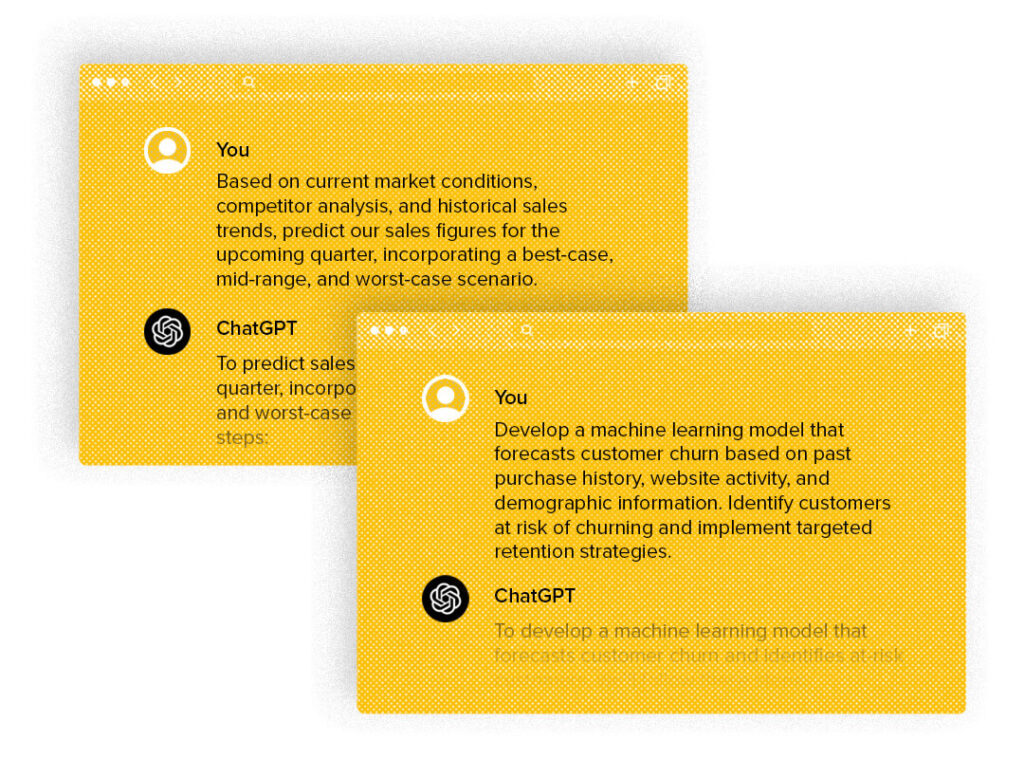
Automate routine tasks
Marketers often spend valuable time on repetitive tasks like creating basic website landing pages or email marketing templates. AI can streamline these processes by generating basic code snippets based on your specifications.
Example prompts for automating routine tasks:
- “Generate the HTML code for a simple landing page promoting our new e-book, featuring a signup form and a product description with a clear call to action button.”
- “Create a Python script that automates the process of generating email marketing campaigns based on pre-defined templates, dynamically inserting personalized customer data and product recommendations.”
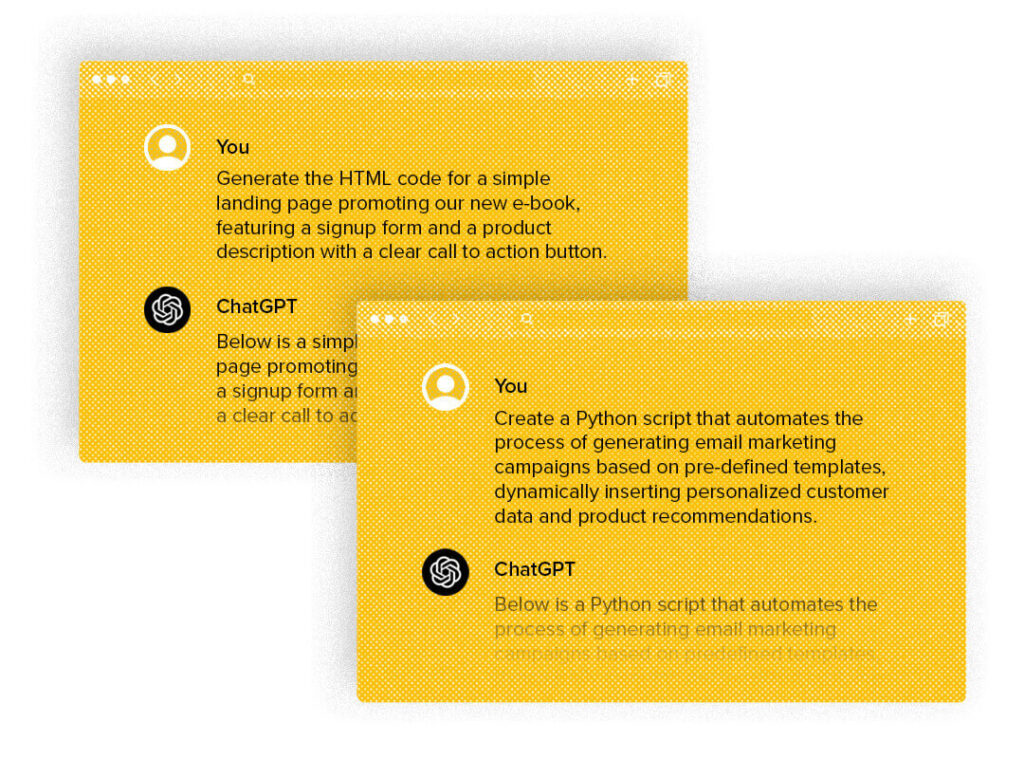
Leave the numbers up to the experts. Learn more about Data Strategy services from Tallwave.
The art of the effective AI prompt
Now that you’re armed with the knowledge of prompt engineering potential, here are some key tips to ensure you get the most out of your AI collaborator:
- Clarity is key: The more specific and clear your prompts are, the better the AI will understand your intent and deliver the desired output. Avoid ambiguity and focus on providing all the necessary context.
- Start simple, refine gradually: Don’t overwhelm yourself with overly complex prompts initially. Start with basic instructions and gradually refine them based on the AI’s response.
- Embrace iteration: The beauty of prompt engineering lies in its iterative nature. Experiment with different prompts for the same task and see what generates the best results.
- Leverage examples and templates: Many AI tools offer built-in templates or successful prompt examples from other users. Utilize these resources as a starting point for your own prompts.
- Remember context is king: The more context you provide about your target audience, brand voice, and desired outcome, the better the AI can tailor its response.
- Think like a teacher: Imagine you’re instructing a student on how to complete a task. Frame your prompts in a clear, concise, and easy-to-understand manner.
Balancing efficiency and ethics in AI
AI has become a powerful tool in the marketer’s arsenal, promising to streamline tasks and unlock new levels of efficiency with perfectly engineered prompts. However, this exciting new frontier comes with a responsibility to ensure its ethical and responsible use.
At its core, AI ethics is a framework of moral principles that guide the development and use of artificial intelligence. Organizations like UNESCO are actively creating guidelines to address potential issues like bias and misuse.
Why should marketers care about ethics in AI? While these tools can be performance game-changers, neglecting ethical considerations can lead to brand damage, legal problems, and even product failures.
Understanding key concerns like data privacy, fairness, and potential biases within algorithms is crucial for navigating the ethical landscape of AI marketing. By acknowledging these challenges and taking proactive steps, marketers can leverage the power of AI responsibly, safeguarding their brand reputation and building trust with customers in the process.
Embrace the future of digital marketing with Tallwave
While AI offers undeniable power and efficiency gains, it’s crucial to remember that marketing is ultimately a human endeavor. The ability to understand customer needs, craft compelling narratives, and build genuine connections remains irreplaceable. The key lies in striking a harmonious balance between cutting-edge AI tools and the irreplaceable human touch.
This is where Tallwave comes in. We can help you navigate the exciting world of prompt engineering, empowering you to leverage the strengths of AI while ensuring your marketing efforts resonate with a human audience. By working together, we can unlock the full potential of AI marketing, achieving success that’s both ethical and impactful. Let’s talk.


